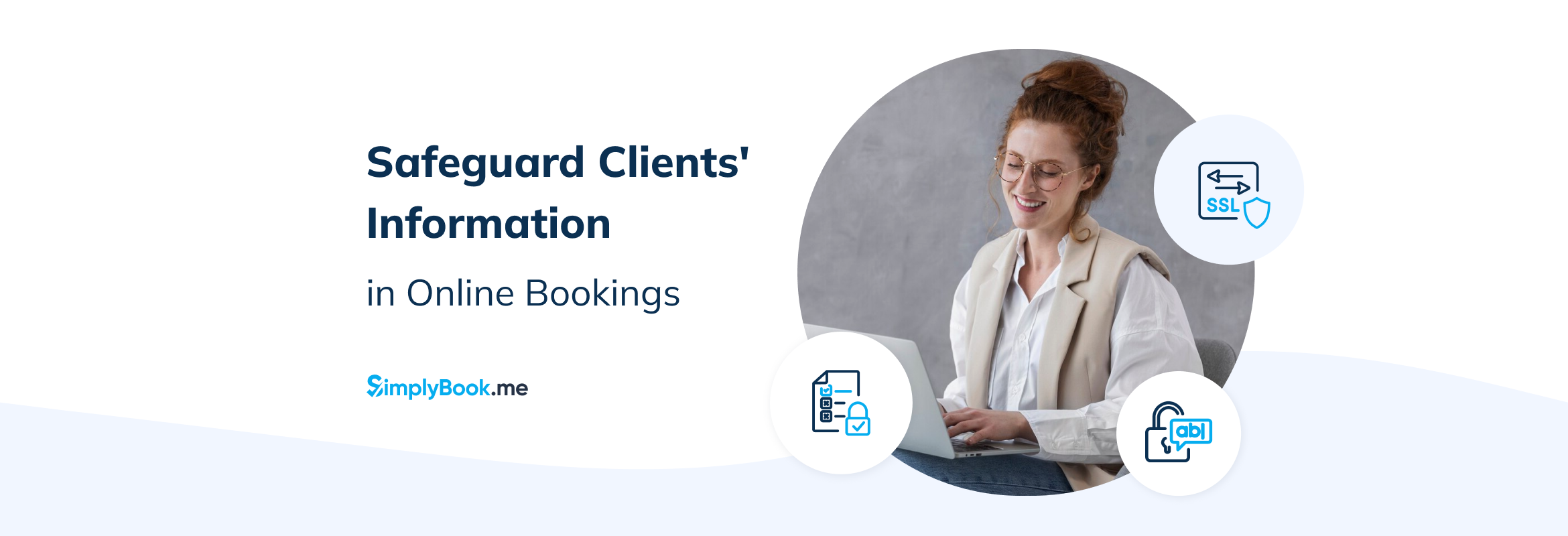How To Safeguard Clients’ Information in Online Bookings

This post is also available in:
![]()
![]()
![]()
![]()
Convenience comes at a cost in our digital age – and that cost is often security risks.
As online bookings become the norm across industries, safeguarding clients’ sensitive information is paramount. In 2022 alone, 1,802 reported cases of data compromise in the US cost businesses an average of $4.45 million.
Combined with the financial costs of a breach of your clients’ information, one security lapse is all it takes to ruin your public reputation. Thus, understanding the criticality of data security for online bookings is vital, and implementing effective security measures to lock down your clients’ invaluable information is foundational to a modern business’ success.
Here, we examine practical strategies for modernizing your cybersecurity systems to ensure you’re legally and ethically compliant and that your clients’ information is safe.
Why is Data Security in Online Bookings So Important?
When clients entrust you with their personal and financial information, they expect you to handle it with the utmost care and confidentiality. A breach of this trust can have severe consequences, both for your clients and your business.
For clients, a data breach can lead to identity theft, financial losses, and a compromised sense of security.
On the business side, the repercussions of a data breach can prove catastrophic. In addition to, substantial financial losses from penalties, legal fees, and plummeted sales, your reputation can completely undermine your future business prospects. As a result, many businesses never recover, forced to close their doors permanently.
Legal Requirements and Data Protection Regulations
Ignorance of the law offers zero protection in our litigious world.
Understanding and complying with relevant data privacy and security regulations is non-negotiable. In particular, covering the EU, the US, and importantly healthcare businesses, the GDPR, CCPA and HIPPA are amongst the most wide-spreading and stringent data protection laws in place.
GDPR and CCPA
If your online booking system handles any personal data from European Union residents or California residents, you must comply with stringent data protection regulations like the General Data Protection Regulation (GDPR) and the California Consumer Privacy Act (CCPA).
The GDPR, considered the global gold standard, mandates rigorous practices such as:
- Obtaining explicit consent to collect personal data
- Providing full transparency about how data is processed
- Allowing users to access, correct, or delete their data
- Implementing technical and operational safeguards
- Promptly reporting data breaches within 72 hours
Violations can trigger massive penalties of up to €20 million or 4% of your company’s global revenue – whichever is higher. The GDPR applies to businesses of all sizes, regardless of their location.
Similarly, the CCPA grants US residents significant rights over their personal information. Key requirements include:
- Disclosing data collection and processing activities
- Allowing consumers to opt-out of data sales
- Providing mechanisms for data access and deletion requests
- Implementing reasonable security practices
Failure to comply with the CCPA can result in civil penalties of up to $7,500 per violation.
With such strict data privacy laws, ignorance offers no excuse. Businesses must prioritize compliance or risk devastating financial and reputational consequences. In the unfortunate event of a data breach, customers may be able to protect themselves with identity theft insurance.
HIPAA for Healthcare Bookings
If you operate an online booking system for medical providers or handle any protected health information, you fall under the Health Insurance Portability and Accountability Act (HIPAA). Importantly, this sweeping law governs:
- Implementing physical, technical, and administrative safeguards
- Limiting PHI access to only authorized personnel
- Maintaining comprehensive audit trails and logs
- Enforcing data breach notification requirements
- Ensuring all business associates also comply
Failure to meet HIPAA rules can lead to civil and criminal penalties reaching millions of dollars per violation. No healthcare provider can afford those costs.
Common Threats to Online Booking Systems
Understanding the key risks enables you to implement proper defenses and monitoring. Some common threats include:
Phishing Attacks
These rely on psychological manipulation rather than brute force hacking. Fraudsters impersonate trusted entities, luring victims into revealing login credentials or other sensitive data.
Malware and Viruses
This malicious code can infiltrate systems in various ways, from infected email attachments to compromised websites. Once inside, it may steal data, cripple operations, or give control to the attacker.
Brute-Force Attacks
Through automated tools, hackers can rapidly cycle through innumerable password combinations to eventually guess correct credentials.
SQL Injection
If web applications have coding vulnerabilities, attackers can inject malicious SQL commands to access or manipulate databases directly.
Insider Threats
Disgruntled employees or dishonest contractors with inside access are often overlooked threats that prove devastating if not mitigated.

Best Practices for Safeguarding Client Information
Make sure you follow these fundamental best practices for securing your client information:
Strong Passwords and Authentication Methods
Never underestimate the power of a strong password policy. To begin with, require all client accounts to use unique, complex passwords over 12 characters long with a mix of character types. Better yet, mandate the use of password manager tools to generate and store virtually unhackable passwords.
Two-factor authentication (2FA) adds an essential second layer. Even if a password is compromised, 2FA prevents unauthorized access unless the attacker also has the 2FA token or code. Simple to implement yet extremely effective.
User Verification and Recognition Security
Voice recognition technology enhances security in online booking systems by using unique voice patterns for user authentication. This advanced method ensures only authorized users gain access to sensitive information.
Implementing audio recording features adds another layer of protection by verifying the authenticity of transactions. This combination of voice recognition and audio recording strengthens security and builds client trust.
Regular Software Updates and Patch Management
Hackers constantly look for vulnerabilities in outdated software versions.
Therefore, staying current with updates and patches from vendors is critical for repairing those holes. Implement a strict patch management process to ensure all software is current across your systems.
Moreover, many breaches stem from failing to apply available updates promptly. Automate updates wherever possible, and develop a regimented schedule for manually updating other software.
Staff Training and Awareness Programs
Your employees are your first and last line of defense.
Even the most sophisticated security measures mean nothing if staff falls for phishing lures or other social engineering attacks.
For example, staff who utilize VoIP phone services as part of customer contact, and handle customer data, should be aware of attempts to steal sensitive information about their customers.
Invest in comprehensive security awareness training that covers topics like:
- Identifying phishing texts, emails, and calls
- Creating and managing strong passwords
- Proper handling of sensitive client data
- Physical security practices like computer locking
- Removing personal information from the internet
Keep training fun, frequent, and updated with the latest threats. One annual course won’t cut it against constantly evolving attack methods.
Step-by-Step Implementation
This step-by-step implementation guide walks through the essential process:
Setting Up a Secure System
- Conduct a Risk Assessment: Objectively evaluate your current security posture across people, processes, and technologies.
- Choose a Secure Booking Platform: Select a reputable online booking solution that meets industry security standards and offers features like encryption, access controls, audit logging, and secure payment processing (more on this below).
- Implement Strong Authentication: Require strong, unique passwords and enable multi-factor authentication (MFA) for all user accounts associated with your booking system.
- Encrypt Sensitive Data: Implement end-to-end encryption using proven algorithms like AES-256 to protect client data at rest, in transit, and in backup storage.
- Secure Website with SSL/TLS: Obtain an SSL/TLS certificate from a trusted provider and enable HTTPS protocol to encrypt data transmitted between user browsers and your web servers.
- Train Staff on Security Protocols: Develop comprehensive security awareness training programs to educate employees on threats, best practices for handling data, and incident response procedures.
- Streamline Software Updates: Establish a formal patch management process to ensure all software powering your booking system stays updated with the latest security patches and fixes.
- Conduct Ongoing Security Testing: Implement continuous monitoring, penetration testing, and audits to identify vulnerabilities proactively before they can be exploited.
Key Features for Booking Software
When evaluating online booking platforms, prioritize these essential security features and capabilities:
- Regulatory Compliance: Ensure the solution meets relevant data protection standards like GDPR, CCPA and HIPAA, based on your industry and regions served.
- Secure Payment Processing: Look for PCI-DSS certified payment gateways that prevent storage of complete credit card data and tokenize sensitive information.
- Access Controls and Permissions: Implement granular role-based access controls to limit data exposure by granting permissions based on job roles and responsibilities.
- Audit Trails and Logging: Comprehensive audit logs tracking all user activities, administration changes, data access, and security events enable forensic analysis.
- Encryption Capabilities: End-to-end encryption should protect data at rest in databases, in transit over networks, and in any backup repositories.
- Incident Response and Breach Notification: Automated breach detection, quarantine capabilities, and mechanisms to notify impacted clients per compliance requirements.
- Third-Party Integrations: Any third-party apps or services integrated with the booking system should undergo stringent vetting for security vulnerabilities.
- API Security: If exposing APIs for integration, mandate secure access protocols like OAuth, input validation, and rate-limiting controls.
By prioritizing security from the ground up, you reinforce your commitment to protecting your clients’ invaluable personal information.
Wrapping Up: The NHS and SimplyBook Case Study
The National Health Service (NHS) in the United Kingdom has reinforced its commitment to safeguarding sensitive patient data through its implementation of the SimplyBook online appointment booking platform. The Shrewsbury and Telford Hospital NHS Trust (SaTH) case study showcases how a comprehensive solution can protect client information while streamlining operations.
SaTH faced significant challenges in efficiently coordinating patient appointments across multiple facilities and services. Their existing processes resulted in extended wait times, missed appointments, and frustration among staff and patients alike.
By integrating SimplyBook’s comprehensive booking solution, SaTH gained access to a powerful centralized system for coordinating appointment scheduling across their healthcare network. This enabled patients to conveniently book and manage their appointments online 24 hours a day, 7 days a week.
However, the true value proposition was SimplyBook’s stringent security features, designed to protect sensitive health information. The platform offered SaTH a dedicated server environment, providing an isolated ecosystem with security controls often mandated in healthcare settings. This closed environment, devoid of traffic from other clients, mitigated security risks arising from potential vulnerabilities or threats originating outside SaTH’s infrastructure, ensuring patient records remain secure and inaccessible to unauthorized entities.
Moreover, SimplyBook’s enterprise-grade security features empowered SaTH to enforce granular access controls and comprehensive audit trails, ensuring compliance with the Health Insurance Portability and Accountability Act (HIPAA) and NHS information governance policies. This ensured that only authorized personnel could access and modify patient records based on their specific roles and responsibilities within the healthcare organization.
The dedicated server environment’s increased performance and substantial capacity to handle high volumes of API calls seamlessly accommodated SaTH’s substantial patient load without compromising speed or uptime, ensuring uninterrupted access to critical healthcare services.
If you are seeking a secure and effective online booking solution for your business, reach out to SimplyBook to learn more about their platforms and dedicated security features. Our team of experts can guide you in implementing a system that prioritizes data protection while enhancing operational efficiency and customer experience.


Comments
0 commentsNo comments yet